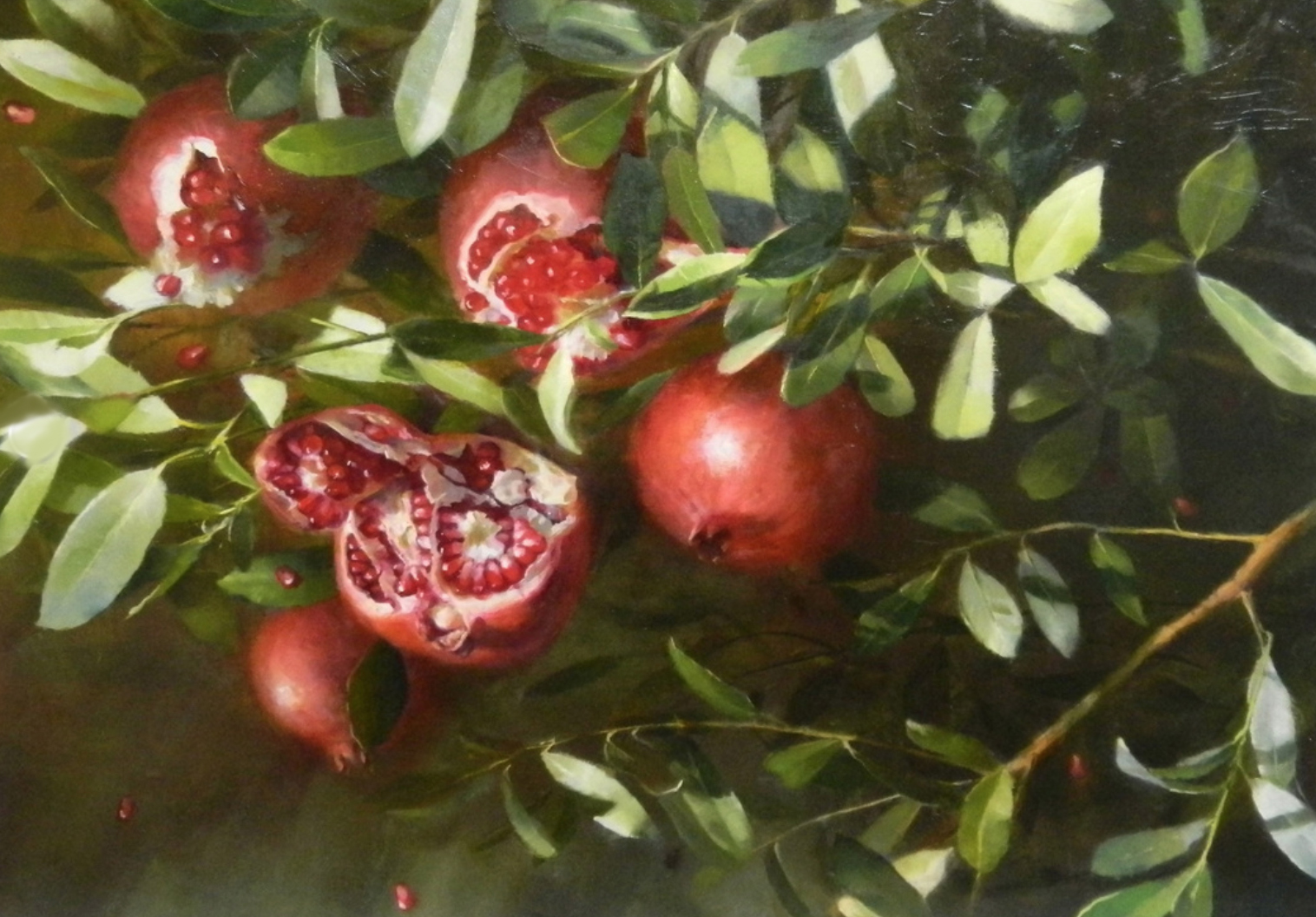March 13: “You Will Know Them By Their Fruits”
♫ Music:
Day 25 - Saturday, March 13
Title: “YOU WILL KNOW THEM BY THEIR FRUITS”
Scripture: Matthew 7:18-28
“A good tree cannot produce bad fruit, nor can a bad tree produce good fruit. Every tree that does not bear good fruit is cut down and thrown into the fire. So then, you will know them by their fruits. Not everyone who says to Me, ‘Lord, Lord,’ will enter the kingdom of heaven, but he who does the will of My Father who is in heaven will enter. Many will say to Me on that day, ‘Lord, Lord, did we not prophesy in Your name, and in Your name cast out demons, and in Your name perform many miracles?’ And then I will declare to them, ‘I never knew you; depart from Me, you who practice lawlessness.’ Therefore everyone who hears these words of Mine and acts on them, may be compared to a wise man who built his house on the rock. And the rain fell, and the floods came, and the winds blew and slammed against that house; and yet it did not fall, for it had been founded on the rock. Everyone who hears these words of Mine and does not act on them, will be like a foolish man who built his house on the sand. The rain fell, and the floods came, and the winds blew and slammed against that house; and it fell—and great was its fall.” When Jesus had finished these words, the crowds were amazed at His teaching; for He was teaching them as one having authority, and not as their scribes.
Poetry:
Growing Apples
by Nancy Miller Gomez
There is big excitement in C block today.
On the window sill,
in a plastic ice cream cup
a little plant is growing.
This is all the men want to talk about:
how an apple seed germinated
in a crack of damp concrete;
how they tore open tea bags
to collect the leaves, leached them
in water, then laid the sprout onto the bed
made of Lipton. How this finger of spring
dug one delicate root down
into the dark fannings and now
two small sleeves of green
are pushing out from the emerging tip.
The men are tipsy with this miracle.
Each morning, one by one,
they go to the window and check
the progress of the struggling plant.
All through the day they return
to stand over the seedling
and whisper.
YOU WILL KNOW THEM BY THEIR FRUITS
A seed is both simple and miraculous. Hold a seed in your hand and you may only see a tiny dry, ugly, withered pip, and yet given the right circumstances for germination, a miracle is unfurled. Within that seemingly dead seed coat lies the potential for beauty and life. In our passage today we read Jesus’ own words of caution to his disciples regarding false teachers. Watch out! Make sure that you carefully judge not only the words that come from their mouths, but also the example of their lives. Sometimes it’s difficult to know one seed from another (particularly, if like me and you are not a gardener!); they often all look alike. But remember, the seed is not the end goal. A seed is not designed to remain a seed, it contains all the information needed to transform into a plant - a plant that will bear fruit, fruit that can be tasted and proven. In order to distinguish a false prophet from a true prophet, Jesus commands his followers to look for the signs of a flourishing plant and examine the fruit that it bears. Not everyone who says to me, ‘Lord, Lord’ will enter the kingdom of heaven.
A seed doesn’t just grow into a tree overnight. It takes months, even years of patient waiting; it takes time. The pomegranate tree takes two to three years to mature before it bears any fruit, the fruit itself takes another five to seven months to grow. That’s a lot of patience - a lot of staring out of the window, waiting for the miraculous, waiting for that hard, tiny stone like seed to take root and transform into the new life of a fruit bearer. This process is miraculous enough to warrant whispers from the men in Gomez’ poem, and yet so very simple.
The transformation from seed to edible fruit also requires just the right soil. Weinman’s The Tree of Life, standing erect in the desert, has found just the right soil, life itself bursting forth in the most unlikely desert conditions. A solid rock seems an unlikely ground for a seed to flourish, and yet in Gomez’ "a crack of damp concrete" gives life, providing the seed with just enough protection from the storms that rage. The miraculous and the simple: those two things need not be incongruous. Jesus tells his disciples that the one who hears his words and acts on them is like a wise man who settles on the hard work of digging out a bedrock foundation for his house. Like the seed protected by the damp concrete crack, the wise man’s house is also founded on the rock. Our lives as followers of Christ also need this firm foundation if we are to produce the necessary fruit.
The pomegranate is often a symbol of eternal and abundant life. In Weinman’s painting Seeds of Mercy III notice how the seeds ooze out of the pomegranates. Mingle this picture with today’s music, and you will hear an echo of Eden and the cultivation of all that was good. Weinman’s pomegranate is good for eating right now, but also bursts forth with seeds that hold the potential for many more pomegranate trees - future hope. Now that’s good fruit! Hearing and heeding the words of Jesus looks like this fruit - fit for the purpose of eating, but also for the purpose of reproducing. A tree that bears good fruit is also a tree that generates more seeds. We see this truth in the quiet regeneration of nature, and we see it in the transformational work of the gospel in the lives of our neighbors and friends. In both situations the foundational bedrock matters; in both situations the process takes time.
As we pray through this period of Lent together, may we continue to participate in the miraculous simplicity of the transformational gospel message. Let us choose to root ourselves firmly in the teachings of Jesus, allowing the Spirit to do the internal transformation that will ooze out into our interactions with others - always looking forward to that future hope found only in Jesus.
Prayer:
For God alone, O my soul, wait in
silence,
for my hope is from him.
He only is my rock and my salvation,
my fortress; I shall not be shaken.
On God rests my salvation and glory;
my mighty rock, my refuge is God.
Trust in him at all times, O people;
pour out your heart before him;
God is a refuge for us. Selah”
Amen.
(Psalm 62:5-8)
Sian Draycott
Instructor, Torrey Honors College
Biola University
For more information about the artwork, music, and poetry selected for this day, we have provided resources under the “About” tab located next to the “Devotional” tab.
About the Artwork #1:
Tree of Life
Melissa Weinman
2013
Oil on panel
48” X 48”
About the Artwork #2:
Seeds of Mercy II
Melissa Weinman
2014
Oil on panel
18” x 24”
The quiet paintings of Melissa Weinman endow transcendent meaning to the natural world. She says of her work, “I’m attracted to all subjects that are translucent and changing, therefore I’m drawn to paint fruit and flowers, water and clouds, and the figure. I aim to capture my subjects through a palpable sense of atmosphere, masterful drawing, and luscious paint handling.” In her work entitled Seeds of Mercy, she paints luscious pomegranates whose seeds burst forth with the promise of rebirth and fecundity. In Christian symbolism, the pomegranate is commonly used as a symbol of the resurrection and the hope of eternal life, because of its abundance of seeds. The seeds bursting forth from the pomegranate are also likened to Christ bursting forth from the tomb. It may also symbolize the church, where the seeds represent the many believers who make up the one universal church.
https://religionfacts.com/pomegranate
About the Artist:
Melissa Weinman is an American artist who grew up in her mother’s painting and ceramic studio, on the prairies of southwest Minnesota where buffalo and prickly pear cactus are native. Weinman went to Bowdoin College in Brunswick, Maine, where she double majored in Creative Visual Arts and Chinese Studies. She spent her junior year at Princeton University and studied painting with New York City artists Arthur Cohen and Howard Buchwald. Weinman pursued her M.F.A. under artists Ruth Weisberg and Ron Rizk at the University of Southern California, where she studied painting and printmaking. Her teaching career began as an assistant professor at the University of Richmond, Virginia, and at the University of Maryland. Her thirties brought Weinman to the Pacific Northwest, where she taught at the University of Puget Sound for fourteen years. In recent years, she has been a teaching artist at the Gage Academy of Art in Seattle, Washington. Currently, Weinman offers atelier-style, solvent-free oil painting instruction in her studio. Her solo museum exhibitions include the Frye Art Museum in Seattle; the Bowdoin College Museum of Art in Brunswick, Maine; and the Arnot Art Museum in Elmira, New York. A solo gallery show of Weinman’s was reviewed by Eleanor Heartney in Art in America.
http://www.melissaweinman.com/
https://www.joewadefineart.com/weinman.shtml
About the Music:
“Pomegranates” from the album Phone to Logos
About the Composer/Performer:
Porya Hatami (b.1981) is an experimental sound artist based in Sanandaj, Iran. His compositions explore the balance between electronics and environmental sounds, utilizing processed acoustic and electronic sources and field recordings. His debut album was released on the UK-based Somehow Recordings in 2012. In 2014, Hatami started working with Berlin-based Uwe Zahn (Arovane), and so far they have released six albums together. Their latest, C.H.R.O.N.O.S., was released in 2019. Phone to Logos is a collection of music that includes unreleased tracks that illustrate distinct sound palettes and aesthetics at play during different periods of composing.
http://poryahatami.com/
About the Poet:
Nancy Miller Gomez is an American poet. She has a M.F.A. in Writing from Pacific University in Forest Grove, Oregon. Her work has appeared in River Styx, Rattle, The Bellingham Review, Nimrod, and elsewhere. A “failed waitress,” she has also worked as a stable hand, an attorney, and a television producer. She currently volunteers as the Director of the Santa Cruz Poetry Project, an organization that provides poetry and writing workshops to incarcerated men and women. Currently, Ms. Gomez lives in Santa Cruz, California.
https://www.nancymillergomez.com/
About the Devotion Author:
Sian Draycott
Instructor
Torrey Honors College
Biola University
Sian Draycott grew up in Wales and graduated from Oxford University with an M.A. in Theology. Her M.A. in Classical Studies from the Open University (UK) developed her research in Greek tragedy and comedy as seen in the relationship between Euripides and Aristophanes. In addition to team-leading with IFES (International Fellowship of Evangelical Students) in Portugal, Sian has experience as a high school teacher in the UK and as an ESL tutor. She loves talking to people about Jesus and watching Wales play rugby.

